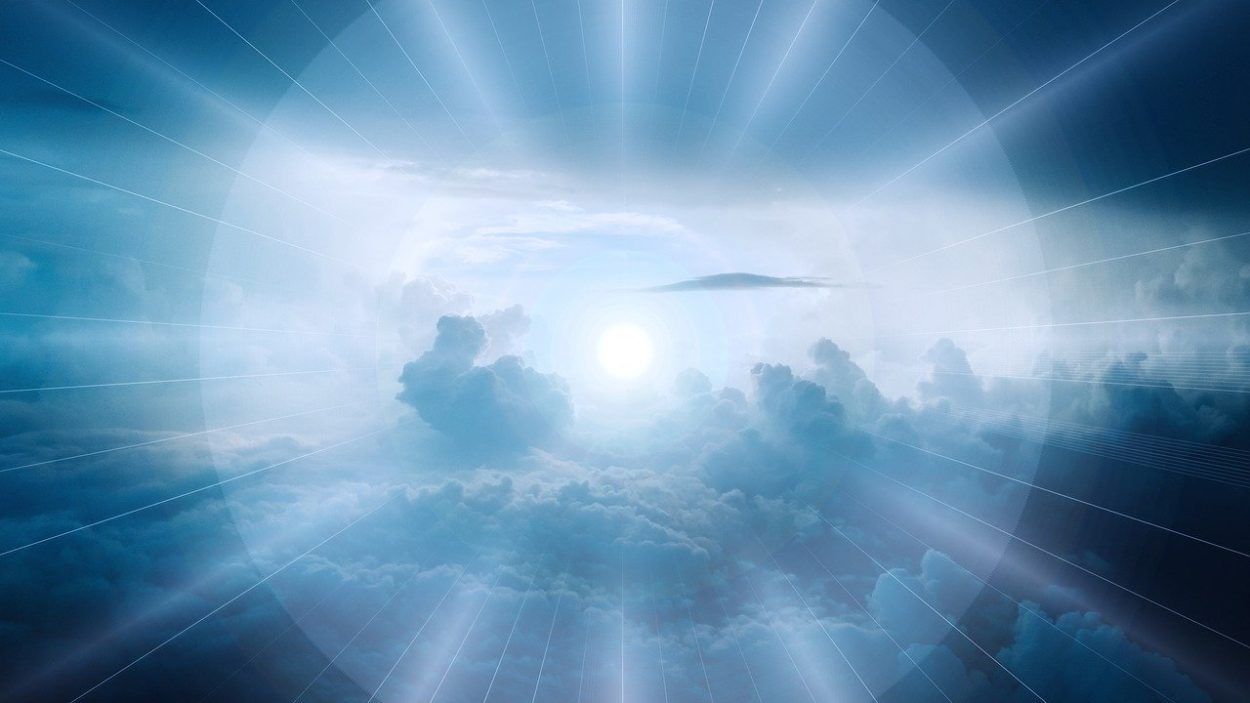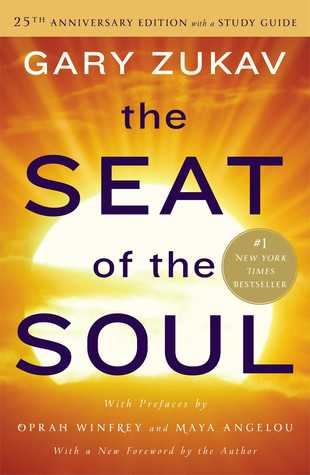In her preface to The Seat of the Soul, Oprah Winfrey writes:
“The Seat of the Soul changed the way I see myself. It changed the way I view the world. It caused a profound shift in the way I conduct all my relationships, business and personal”
Then there’s another preface by Maya Angelou, with more high praise for the book. So I read it with high expectations.
Did it change the way I see myself? Not exactly. I didn’t agree with all of Gary Zukav’s claims, but I did find a lot of useful ideas about living a better life, ideas I’d like to record here so that I have a shot at remembering them in the chaos and distractions and temptations of daily existence.
External Power vs. Authentic Power
Zukav argues in The Seat of the Soul for a new kind of evolution, a spiritual evolution of our species instead of a physical one. The terminology he uses is that we are evolving from five-sensory to multi-sensory beings.
As five-sensory beings, we strove for mastery over the world around us, the things we could see, hear, smell, taste and touch. Zukav calls this “external power“: the power to control other people, animals and our environment, to create hierarchies and to stand at the top of them.
Because external power is inherently unstable and can be won or lost at any time, this kind of competitive, acquisitive life is often violent and fear-based. No matter how much external power we have, we are always afraid of losing it and are often willing to use violence (or to allow others to use violence on our behalf) as we struggle to maintain our power.
As multi-sensory beings, on the other hand, we let go of fearful, competitive, survival-driven thinking and gain what Zukav calls “authentic power“, which is the power that comes from listening to the highest part of ourselves, from being aligned with our souls.
As multi-sensory beings, we see ourselves as being part of a larger whole. Violence and hatred no longer make sense, because harming others means harming ourselves. Instead, we live with reverence for all of life, treating all beings and indeed the planet itself as sacred.
Reverence
When we live with reverence, it is not possible for us to exploit other people, animals, or the planet. We live more spiritually, relying on our hearts and our emotions, listening to our intuition. And we recognise the rights of others and of the Earth.
What of violence in nature, such as one species feeding on another? Zukav sees that as part of a natural redistribution of energy within an ecosystem, with each creature taking only what it needs. That’s very different from killing wastefully, mindlessly or, most chilling of all, for fun.
What of evil? How do we show reverence for people who do terrible things? Zukav’s answer is that evil is the absence of light, and it brings pain and suffering on the perpetrators because they are disconnected from their souls and because karma will require them to experience the consequences of their actions, either in this life or another.
If we hate evil people, we also experience this absence of light, this pain and suffering. We bring it all on ourselves. So the appropriate response is to stand up against evil actions, but to have compassion for the perpetrators.
Relationships
We have traditionally structured human relationships based on external power. Marriage, for example, is a contract in which two people come together to ensure physical survival—usually through an unequal partnership in which the man has more power.
Zukav argues instead for “spiritual partnerships“, in which two people come together in an equal and open relationship based on respect and reverence, and aimed at fostering their spiritual development (what Zukav calls the “vertical path“). The partnership may last a lifetime, but the commitment to stay together is voluntary and can be ended at any time if it is no longer contributing to the spiritual growth of each party.
Similarly with relationships in the wider society, they have traditionally been structured based on external power, and they now need to change to reflect authentic power:
“So long as those who strive to establish harmony at the level of nations have within themselves the anger and violence that they seek to heal between nations, the harmony that they seek to create at the macrocosmic level cannot come into being.”
The Meaning of Life
Zukav argues in The Seat of the Soul that every soul has a task that it came to this world to complete. An unempowered personality that is not aligned with or even aware of its soul’s calling cannot complete this task. These people often take refuge in acquiring external power, but this cannot compensate for the lingering sense of inner emptiness. Something is always missing.
When we are completing our task, however, we feel energised and alive, at one with what we are doing. (The task doesn’t have to be some grand vision, like curing cancer or achieving world peace—it could also be something like loving your family or learning a better way to live.)
Power, then, comes from achieving alignment with the soul, becoming aware of what we came here to do, and doing it. And the best way to do it is by letting go:
“Take your hands off the steering wheel. Be able to say to the Universe, ‘Thy will be done,’ and to know it within your intentions … The final piece of reaching for authentic power is releasing your own to a higher form of wisdom.”
Where I Part Company
I didn’t agree with everything in The Seat of the Soul. Essentially, it’s a series of assertions about the way life works that are stated as immutable fact, even though neither Gary Zukav nor anyone else has any way of knowing whether they’re true or not. So my approach in reading it was to keep an open mind and reflect on its ideas, without feeling a need either to accept or reject it wholesale.
Some parts felt wrong or arbitrary to me, such as the positioning of human souls as innately different from animal souls. Why do we get individual souls, while animals only get “group souls”? And why does Zukav believe there are divisions between animals, with dolphins on a higher level than horses?
I also have a problem with the implications of the author’s views on reincarnation. First of all, I simply find it hard to believe that we sit up in the Universe somewhere with a bunch of guides and teachers and decide on how we want to incarnate on this Earth, on what lesson our souls need to learn.
But, more importantly, I worry about how that makes us view other people, especially those who are suffering terribly. Zukav’s theory implies that people born in horrific poverty chose that destiny because they wanted to learn something from it. Before reading this book, I’d already heard a couple of friends with spiritual leanings saying similar things.
Both Zukav and the friends who claimed that the poor had chosen to be poor would also argue in favour of compassion and help. But still, this way of viewing the inequalities of the world strikes me as incredibly dangerous. It chips away at the rage we should rightfully feel at the needless suffering of millions of people for the sake of enriching a few. To me, it implies a stance of compassion but non-intervention.
On the issue of social (in)justice, I’m with Angela Davis: “I am no longer accepting the things I cannot change. I am changing the things I cannot accept.”
But for many of his other views, such as showing reverence for all of life and evolving from external power to authentic power, I’m with Gary Zukav. How about you?





There are 7 comments
Like you, I ended up reading this long after many other people had already told me that I “should”. And I was glad that I hadn’t rushed for it, because I wasn’t all that impressed and would have rained on the parade of their enthusiasm. There are some solid key principles here, so I wonder if maybe, for some readers, this is the one book they’ve read which provokes this kind of inner conversation, so it really stands out in that context? It felt to me like there was some kind of hierarchy at play under the surface of all of this seemingly-inclusive worldview.
Yeah, it’s an awkward conversation, isn’t it? “This book changed my life!!!” “Meh, it was OK.”
I think Zukav has a very good way of framing things, e.g. his idea of going from five-sensory to multi-sensory beings. So even ideas that have been around for a while seem quite new in his phrasing. Maybe that accounts for the appeal?
I agree about hierarchy, and it’s kind of what I was alluding to at the end. Rationalising the divisions in our world as part of our individual spiritual choices instead of as systemic injustices is a good way of helping privileged people feel OK about themselves and delaying the urgency of change. I don’t think that’s Zukav’s intention, but I do think it’s a likely consequence of this kind of worldview.
Thank you, excellent review. I’ll be using it when facilitating a group reading of Ultimate Human, since it is entirely relevant to that book as well.
I think it is difficult to express philosophy from within the box of our five-sensory culture, (a term I find quite arbitrary, but, hey, within the box we need labels), that doesn’t come off as elite and self-serving.
Considered as an aspirational outlook rather than an assertion of present day actuality, Zakav’s work has much to recommend it.
Hi David, Thanks for your comment—I’m glad you liked the review, and please do use it in your group reading and anywhere else you want. I agree, there’s plenty to aspire to here. Looking back now from almost a year later, what’s stayed with me the most is the concept of authentic vs external power. I think about that quite a lot, and I’ve realised how much of life is about people struggling for external power. When I stop and think and try to act more in line with the highest part of myself, I usually end up behaving differently.
Mostly garbage. He has zero understanding of the way biological evolution works. The rest is semi-spiritual bunk dressed up in pseudo science. Yet another grifter that Oprah has helped to foist on the world.
Souls are incorporeal creations which each human has received (incarnated) from Heaven ever since primitive mankind. They were part of human theology until the Eastern Roman Emperor cleverly removed them. Science disavows incorporeality and human religions deny souls. Each soul spends a human lifetime with its human host, and retains that immortal memory forever. The soul is invested with spiritual capabilities to warn and guide its host in opportunities and dangers of life on Earth. When that life ends, the soul escorts its host to Heaven. Because the human body has many parts which naturally do not survive physical death, some references mention a so-called “spiritual afterlife.” Survivors of at least one type of NDEs claims they carry everything with them.
??